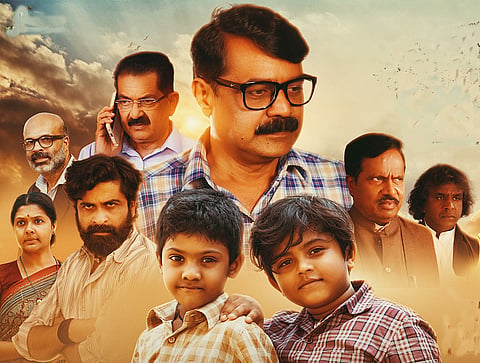Guri Movie Review: Honest intentions, lost in translation
Guri (2.5 / 5)
Kannada cinema has occasionally paused its mainstream diversions to reflect on one of the state’s most pressing realities—the decline of government schools. Rishab Shetty’s Sa Hi Pra Shaale Kasaragodu (2018) is one example that examined the politics of language and the vulnerability of children stuck in the crossfire. Interestingly, the title Guri itself carries cinematic history; it was once the name of a Dr Rajkumar film. Now, director Selvam Mathappan, who is also the cinematographer, reuses the name to tell a different story, one rooted in a rural classroom. Drawing inspiration from the true incident of a school reopening in Kuppalli near Kolar, the film situates itself in the soil of Theralli Hill and dares to ask: what happens to a village when its school is left to fade away?
Cast: Mahanidhi Sai Tej, Jivith Bhushan, Achyuth Kumar, Ugramm Manju, Jayashree S Raj, Avinash, and T S Nagabharana
Director : Selvam Mathappan
The premise is simple yet urgent. A lone classroom stands with 16 students, guided by a teacher (Achyuth Kumar) who is more than just a custodian of knowledge. He is also a caretaker, disciplinarian, and the moral compass. Achyuth Kumar, one of Kannada cinema’s most versatile performers, sheds his usual theatricality for a performance that is stripped down, steady, and quietly moving. His portrayal reminds us that the dignity of a teacher lies not in grandeur but in persistence.
The children carry the film’s emotional pulse. Brothers Subbu (Mahanidhi Sai Tej) and Madesha (Jivith Bhushan) symbolise both promise and burden through their bright minds shackled by a difficult home. Their father, played by Ugramm Manju, is initially drawn as the stereotypical villain of rural melodramas—alcoholic, gambler, and indifferent — and yet, he resists typecasting, surprising us with a gradual, believable transformation into a parent seeking redemption. Jayashree S Raj, as the mother, shoulders the quiet strength of a woman who has seen more battles than she speaks of.
The film’s central conflict, the dwindling student numbers, reflects a real crisis. By law, government schools need at least 12 students to remain functional. Many villages, seduced by the promise of English-medium private institutions, fail to keep up. When the children of Kuppalli realise their school might shut down, their decision to march to Bengaluru and plead with the Chief Minister (TS Nagabharana) becomes both dramatic and symbolic.
The film detours into a convoluted organ-smuggling subplot, a move that seeks to heighten tension but instead feels at odds with the grounded struggles of the first half. These diversions risk trivialising the very core; education as survival. Where the narrative shines is in its quieter registers: the community huddling to keep the school alive, the teacher’s modest victories, and the children’s play that hides anxiety about the future.
The latter half introduces a media head (Avinash), whose intervention shifts the balance of power. The climax, where the Chief Minister decrees that a school may reopen even for a single student, lands as a powerful political and emotional statement; one that redeems some of the film’s narrative indulgences.
Technically, the film is functional rather than striking. The rural setting is captured with sincerity, but the lack of visual flair undercuts the gravity of the theme. Still, the performances—particularly Achyuth Kumar and Ugramm Manju—lift the narrative beyond its uneven writing.
Guri ultimately belongs to the same conversation as those films that spotlight government schools. Guri can also be seen as a children’s film, with students themselves emerging as the true protagonists of the narrative. It may stumble in execution, but its intent is unmissable. At its best, it reminds us that these modest institutions once shaped generations of leaders and thinkers. At its weakest, it slips into melodrama and unnecessary detours.
As a critical text, Guri is not flawless cinema. But it is an important reminder, especially at a time when rural schools face extinction, that education is not merely a right; it is a fight, often led by children and teachers who refuse to let the classroom die.

